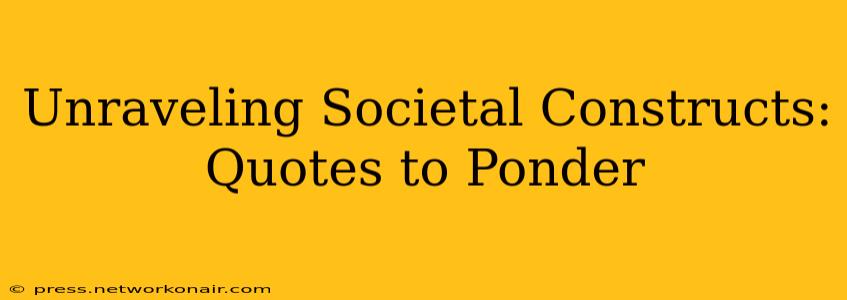Unraveling Societal Constructs: Quotes to Ponder and Their Profound Implications
Societal constructs—the shared beliefs, ideas, and behaviors that shape our understanding of the world—are often invisible forces governing our lives. They dictate our norms, values, and expectations, influencing everything from gender roles to economic systems. By examining powerful quotes that challenge these constructs, we can gain a deeper understanding of their impact and begin to question their validity. This exploration will delve into the inherent complexities and often-unseen biases embedded within the fabric of our societies.
What are some examples of societal constructs?
Societal constructs are numerous and varied, encompassing a wide spectrum of human interaction and belief. Some prominent examples include:
- Gender roles: The socially defined behaviors and expectations associated with being male or female. These often differ significantly across cultures and time periods.
- Race and ethnicity: Categories created to classify individuals based on perceived physical characteristics and ancestry, often carrying significant social and political weight.
- Class and socioeconomic status: A system of stratification based on wealth, income, education, and occupation, influencing access to resources and opportunities.
- Family structures: The accepted models of kinship and family relationships, which vary widely across cultures.
- Nationalism and patriotism: Shared identities and loyalties based on belonging to a specific nation-state.
- Beauty standards: Socially constructed ideals of physical attractiveness that vary across cultures and time periods.
- Moral and ethical codes: Socially agreed-upon rules and principles governing behavior, often influenced by religious or philosophical beliefs.
How do societal constructs impact our lives?
Societal constructs deeply influence our self-perception, our interactions with others, and the opportunities available to us. They shape our aspirations, our beliefs, and even our understanding of reality. For example, ingrained gender roles can limit career choices, while racial biases can lead to systemic inequalities. Understanding how these constructs function is crucial to fostering a more just and equitable society.
How can we challenge societal constructs?
Challenging deeply ingrained societal constructs requires critical thinking, self-reflection, and a willingness to question the status quo. It involves actively seeking diverse perspectives, engaging in open dialogue, and advocating for social change. This process can be uncomfortable, but it is essential for fostering growth and creating a more inclusive and equitable world.
What are some quotes that challenge societal constructs?
Here are some thought-provoking quotes that encourage us to question and critically analyze societal constructs:
"The unexamined life is not worth living." - Socrates
This foundational quote highlights the importance of self-reflection and critical analysis. It urges us to actively question our assumptions and beliefs, rather than passively accepting societal norms. It's a call to intellectual independence and the pursuit of truth.
"The only way to do great work is to love what you do." - Steve Jobs
This quote challenges the societal construct that equates success solely with material wealth or prestigious careers. It suggests that personal fulfillment and passion are equally, if not more, important drivers of success.
"The mind is everything. What you think you become." - Buddha
This quote underscores the power of individual thought and perspective in shaping our realities. It challenges societal constructs that attempt to define or limit us based on external factors, emphasizing the importance of self-belief and inner strength.
"We must let go of the life we have planned, so as to accept the one that is waiting for us." - Joseph Campbell
This quote challenges societal expectations of linear progression and rigidly defined life paths. It encourages embracing unforeseen opportunities and accepting the unexpected turns life may take.
"Be the change that you wish to see in the world." - Mahatma Gandhi
This powerful quote is a call to action, urging individuals to actively participate in creating positive social change. It rejects passive acceptance of societal inequalities and encourages each of us to be agents of transformation.
Conclusion:
Unraveling societal constructs is a continuous process of critical examination and self-reflection. By engaging with thought-provoking quotes and actively questioning the assumptions that shape our world, we can move towards a more just, equitable, and inclusive society. The journey of understanding and challenging these constructs is a vital step in personal growth and social progress.

